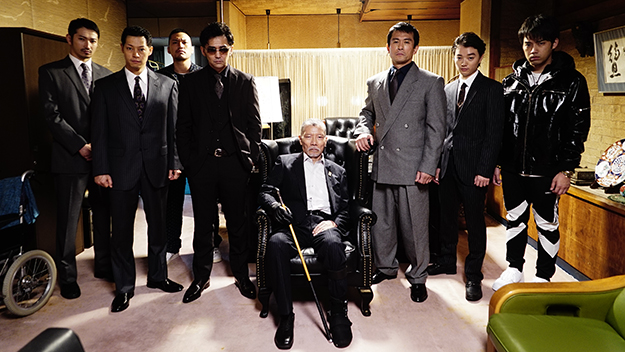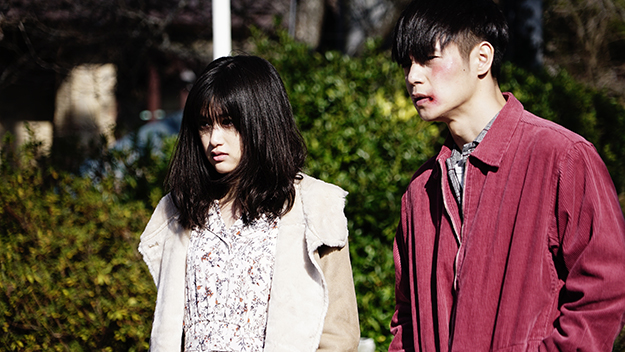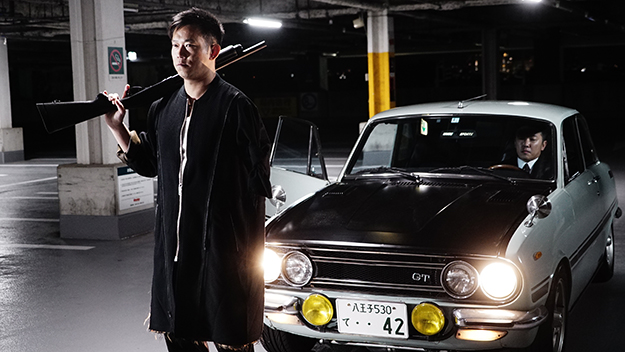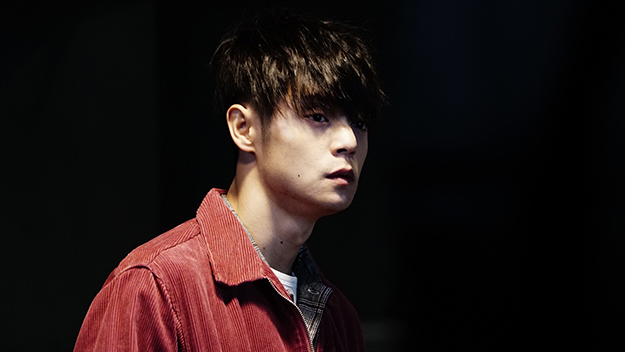Film of the Week: First Love

Images from First Love (Takashi Miike, 2019)
The tone of Takashi Miike’s latest film is best encapsulated by a single image: a close-up of a freshly severed head, its features wreathed in a goofy, blissed-out grin. This is apparently the 103rd film from the prodigiously prolific and versatile Japanese director, whose work is usually, though not always, considered synonymous with excess, provocation and no-holds-barred craziness in assorted genres. So it counts as typical perversity that his new yakuza action extravaganza is innocuously entitled First Love.
In fact, gauche innocence and a note of coy sentiment are very much a constant in the film. It’s the story of a girl and a boy—pure-hearted, but tainted by contact with a corrupt world—who find each other amid a maelstrom of madness and gang warfare. The plot is laden with byzantine complications, although you can happily ignore much of the detail: narratively, what matters at heart is these two kids making it in one piece through the storm. But what you really care about is the storm itself: a flurry of crooks and creeps double-crossing each other, chasing each other in fast cars and slicing off the occasional limb, while the ingénues look on incredulously as they duck the flying debris.
The end credits’ still portraits of key cast members—set to the magnificently raunchy squalling sax of Koji Endo’s score—make you realize what a redundant clutter of dramatis personae the film is laden with. So here are just the basics. Leo (Masataka Kubota) is a young boxer on the rise; somehow unable to get excited about his success, he finds himself suddenly thinking about his purpose when he is told that he only has a short time to live. His first action is to clout the pursuer of a young woman he sees fleeing through the Shinjuku streets one night. She is Yuri, aka Monica (Sakurako Kanishi), who has been sold by her father into sex slavery to a pair of lowlifes to pay off his drug debt.
Monica is on the run because she has innocently been implicated in the theft of a consignment of heroin—a conspiracy between bent cop Otomo (Nao Ohmori), who resembles a permanently frazzled Columbo in a Beatle wig, and baby-faced, taser-wielding junior yakuza Kase (Shota Sometani, who has a definite dash of Leonardo DiCaprio back when he resembled a petulant Angora cat). Monica is now being pursued by these two, and by her jailer Julie (Becky), increasingly deranged and vengeful, now that her hood boyfriend has been slaughtered. All this happens against the background of a turf war between a Tokyo yakuza firm and a Chinese gang whose members include much-feared bruiser “One-Armed Wang”—who may have lost one limb to his foes but still has a mean style juggling a rifle with the other.

The assorted changes of allegiance and quick-fire eliminations of Masa Nakamura’s script don’t really matter. Miike has made numerous yakuza-related films—including the hallucinogenic, almost Buñuelian Gozu and 2015’s vampire-themed Yakuza Apocalypse—and knows, if anyone does, that underworld intrigue is merely a motor to generate action, in as perfunctory a manner as is necessary. But First Love, typically for Miike, is about more than action: it’s about the way that action can be laced with stylistic frills, eccentric imagery, telling character touches. It’s about the “music” that routine action business can be infused with—although often in Miike, that music can be oompah-oompah opera buffa, as in the figure in Yakuza Apocalypse who turns up in a giant frog costume.
While there’s nothing so willfully zany here, there is some distinctively macabre invention: like the yakuza, high on smack, who gets an arm hacked off and coolly mutters, “That hurt… I think.” There are incidental touches like a mechanical puppy used as a fire bomb; or a nice non-sequitur scene in which a drunken nurse turns up, giggling with out-of-it hilarity. Then there’s the apparition that haunts Yuri. Drugged up to the gills by her captors, she’s also dogged by a nightmarish past, pursued by a hallucination of her abusive father, a bespectacled phantom in Y-fronts who keeps appearing from beneath a shroud-like bedsheet. At one point, Leo passes Yuri his headphones hoping to distract her from her mirage; instead, what she sees is Dad doing a goofy dance to the pop song in her ears.
Most of the characters are routine cut-outs: scowling bruisers, inept dorks, the child-like leads. But juicy performances bring some of them to life. Best of all is Sometani’s wonderfully creepy Kase, coasting indestructibly through the chaos, incredulously delighted by his own deviousness, and occasionally putting on a mock-authoritative “angry yazuka” voice to impress his bosses. Another barnstorming turn is Julie, played by Becky, a TV personality or tarento—a term derived from “talent,” and according to Wikipedia, roughly connoting “famous for being famous.” Becky—just Becky—may not be subtlest performer, but by God she has no qualms about letting rip. Her Julie becomes more demon than woman, pelting furiously through the streets, bare-legged as she wields a crowbar and screaming blue murder at all comers, or clinging to Kase’s windscreen like an implacable J-horror wraith.

Kubota’s Leo is made of more slender stuff, a tough-but-tender dreamboat of the non-threatening teen idol variety—but he has his moments too, notably a priceless look of astonishment when someone gets killed in front of him. Konishi, it must be said, is somewhat insipid in a fairly insipid role: for much of the time, her Yuri doesn’t do much more than tremble and look terrified, although she does get to kick one significant male character in the balls, and has a nice moment hoovering up spilled drugs off someone’s lap.
Miike’s international breakout hit, 1999’s notorious Audition, marked him out as a provocateur who was ready to try anything; his taste for outrage was fully indulged in the likes of ultra-violent Ichi the Killer and comprehensive taboo flouter Visitor Q, which both achieved legendary status among adepts of Asian “extreme cinema.” In recent years, however, Miike has successfully made a bit for auteur respectability, with historical pieces like 2010’s briskly imposing 13 Assassins and the altogether more sedate Hara-Kiri: Death of a Samurai, a rather academic 3D remake of a Masaki Kobayashi film.
Those two films, together with 2017’s supernaturally tinged historical drama Blade of the Immortal, were produced by the fabled Jeremy Thomas, whose name on a film tends to denote both international prestige and some degree of auteur provocation (in the West, he has worked with Bertolucci, Cronenberg, and Roeg; in Japan, with Kitano and Oshima). Thomas has also produced First Love, but this film doesn’t have an iota of art-house respectability. Yes, Miike is somewhat more moderate than he has been: at one point, when someone is run over by a car, he contents himself with just showing the vehicle bumping, with an ominous crunch on the soundtrack. But overall, First Love is full-on comic-strip entertainment: there’s even a moment near the end when live action suddenly turns into anime in blazing lysergic colors, complete with spelled-out sound effects à la 1960s TV Batman. Whether Miike did this for the sheer hell of it, or to replace a stunt sequence that went wrong, or one that was too cheap or tricky to film in the first place, who knows or cares—it’s a blast however you take it.

The theme of innocents mixed up in criminal mayhem reminded me, of all things, of Edgar Wright’s Baby Driver, partly because Yuri/Monica is depicted in similarly lukewarm stereotypical terms as Lily James’s waitress in that movie. Wright obviously owes plenty to Asian actioners—although you imagine that filmmakers like him and Ben Wheatley, who tried his hand at Asian-style gunplay in the somewhat dogged Free Fire, would love to work with such insouciant brio as Miike, who tends to do his thing with minimal fuss, then moves on to the next idea, or the next film.
If you want to see how effectively businesslike Miike can be, warm up with a parking lot showdown à la Walter Hill, with a bunch of vehicles careening around in an enclosed space; then watch the big extended confrontation in a supermarket, where the assembled cast plays tag in and out of the grid of aisles, and where there’s always another handgun or samurai sword to be seen poking around the end of a shelf. And to prove that Asian action doesn’t have to be speedy or balletic, watch the two wounded mob heads lumbering at each other like two deranged golems.
Miike paints in broad strokes, with Monica’s and Leo’s backstories used quite cavalierly as triggers for a little sentiment to leaven the mix. But his storytelling allows for a dash of grandeur too: a mobster dying alone in his car as a magnificent sunrise comes up in the background. First Love is undeniably minor, milder Miike, but as a job of work, executed with devil-may-care flamboyance and a merciless sense of its own absurdity, it’s hugely entertaining. You’ll find yourself grinning, whether or not your head is still attached to your body.
Jonathan Romney is a contributing editor to Film Comment and writes its Film of the Week column. He is a member of the London Film Critics Circle.







